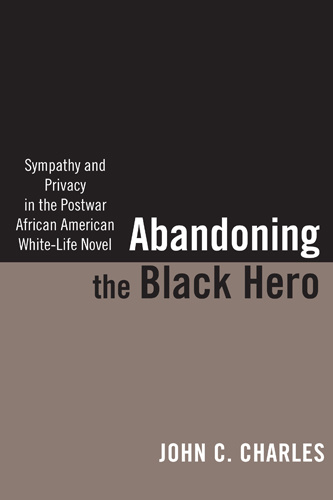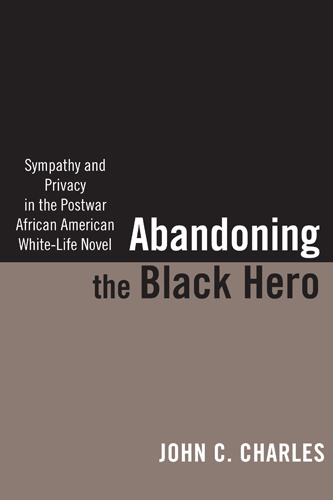
Abandoning the Black Hero
Sympathy and Privacy in the Postwar African American White-Life Novel
Abandoning the Black Hero is the first book to examine the postwar African American white-life novel—novels with white protagonists written by African Americans. These fascinating works have been understudied despite having been written by such defining figures in the tradition as Richard Wright, Zora Neale Hurston, James Baldwin, Ann Petry, and Chester Himes, as well as lesser known but formerly best-selling authors Willard Motley and Frank Yerby.
John C. Charles argues that these fictions have been overlooked because they deviate from two critical suppositions: that black literature is always about black life and that when it represents whiteness, it must attack white supremacy. The authors are, however, quite sympathetic in the treatment of their white protagonists, which Charles contends should be read not as a failure of racial pride but instead as a strategy for claiming creative freedom, expansive moral authority, and critical agency.
In an era when “Negro writers” were expected to protest, their sympathetic treatment of white suffering grants these authors a degree of racial privacy previously unavailable to them. White writers, after all, have the privilege of racial privacy because they are never pressured to write only about white life. Charles reveals that the freedom to abandon the “Negro problem” encouraged these authors to explore a range of new genres and themes, generating a strikingly diverse body of novels that significantly revise our understanding of mid-twentieth-century black writing.
Engaging central discussions in the field of African American literary study, Abandoning the Black Hero is the most astute and comprehensive discussion of the white-life novel, to date.
Once called 'raceless' literature—and traditionally little acknowledged in the African American literary tradition—works with white protagonists written by black authors have begun to receive the recognition they deserve. Charles builds on this burgeoning scholarship, challenging the essentialist notion that black writers must limit themselves to the subject of black life and that those writers who abandon this subject lack racial pride. Charles makes a convincing case that white-life novels allow black authors to express themselves beyond the limitations of race and that black writers can provide a unique perspective on whiteness. A cogent, clearly written work. Recommended.
With Abandoning the Black Hero John C. Charles has written a brilliantly insightful and highly accessible analysis of the white-life novel, a long-neglected area of African American literature.
Taps into long-cemented ideas about what is expected of African American writers in terms of affinity and subject matter … [Charles] locates the African American desire to fictionalize whiteness at a moment when middle-class domestic life was becoming a mainstream ideal at the same time that the demise of Jim Crow amid antisegregation successes jeopardized that new enclave of consolidated whiteness.
An amazing study...[offering] insightful, provocative, and novel analyses of often ignored African-American literary works. Charles' sharp investigatory eye makes Abandoning the Black Hero a must-read for all literary scholars and students.
Engaging central discussions in the field of African American literary study, Abandoning the Black Hero is the most astute and comprehensive discussion of the white-life novel, to date.
Once called 'raceless' literature—and traditionally little acknowledged in the African American literary tradition—works with white protagonists written by black authors have begun to receive the recognition they deserve. Charles builds on this burgeoning scholarship, challenging the essentialist notion that black writers must limit themselves to the subject of black life and that those writers who abandon this subject lack racial pride. Charles makes a convincing case that white-life novels allow black authors to express themselves beyond the limitations of race and that black writers can provide a unique perspective on whiteness. A cogent, clearly written work. Recommended.
Taps into long-cemented ideas about what is expected of African American writers in terms of affinity and subject matter … [Charles] locates the African American desire to fictionalize whiteness at a moment when middle-class domestic life was becoming a mainstream ideal at the same time that the demise of Jim Crow amid antisegregation successes jeopardized that new enclave of consolidated whiteness.
With Abandoning the Black Hero John C. Charles has written a brilliantly insightful and highly accessible analysis of the white-life novel, a long-neglected area of African American literature.
An amazing study...[offering] insightful, provocative, and novel analyses of often ignored African-American literary works. Charles' sharp investigatory eye makes Abandoning the Black Hero a must-read for all literary scholars and students.
***NOTE: Author has legally changed his name to John Charles Williamson.***
All future publications will be under this new name.
JOHN C. CHARLES is an assistant professor of English and Africana studies at North Carolina State University.
Introduction
1. "I'm Regarded Fatally as a Negro Writer": Mid-Twentieth-Century Racial Discourse and the Rise of the White-Life Novel
2. The Home and the Street: Ann Petry's "Rage for Privacy"
3. White Masks and Queer Prisons
4. Sympathy for the Master: Reforming Southern White Manhood in Frank Yerby's The Foxes of Harrow
5. Talk about the South: Unspeakable Things Unspoken in Zora Neale Hurston's Seraph on the Suwanee
6. The Unfinished Project of Western Modernity: Savage Holiday, Moral Slaves, and the Problem of Freedom in Cold War America
Conclusion
Notes
Works Cited
Index




